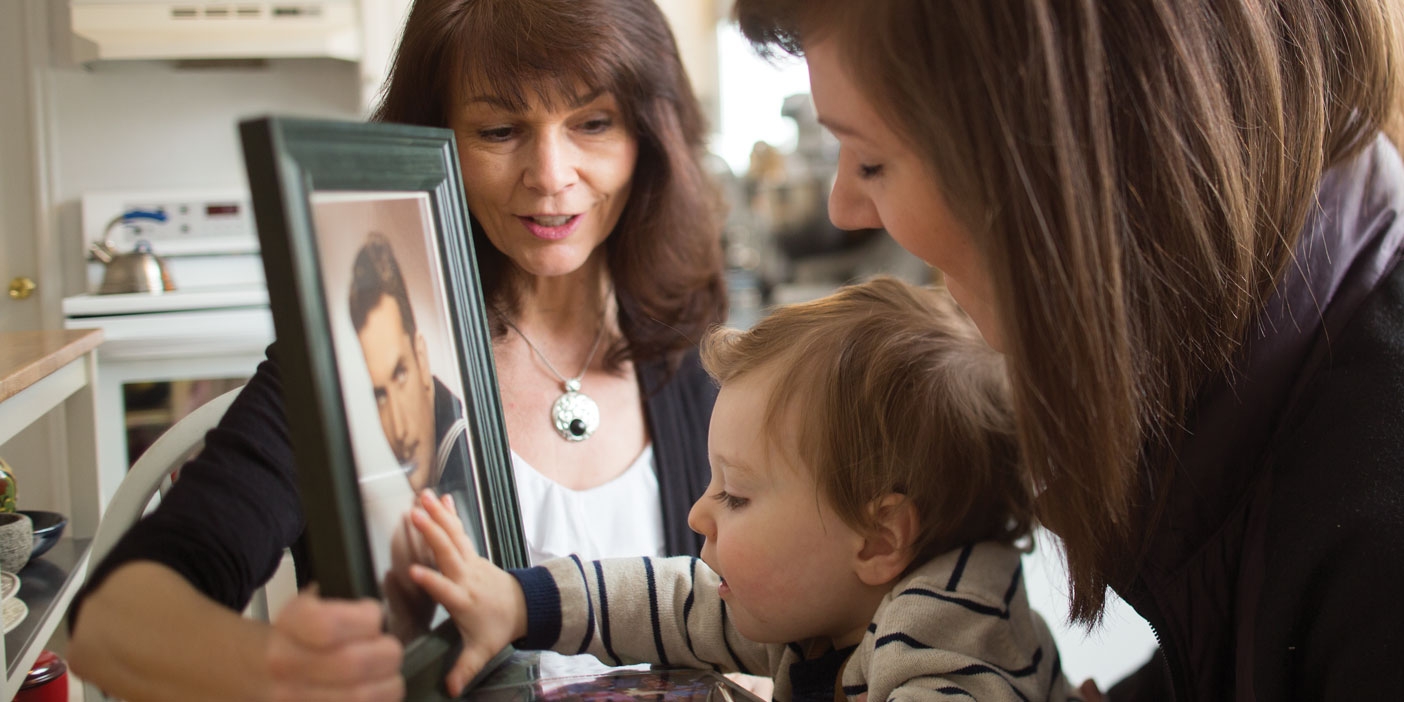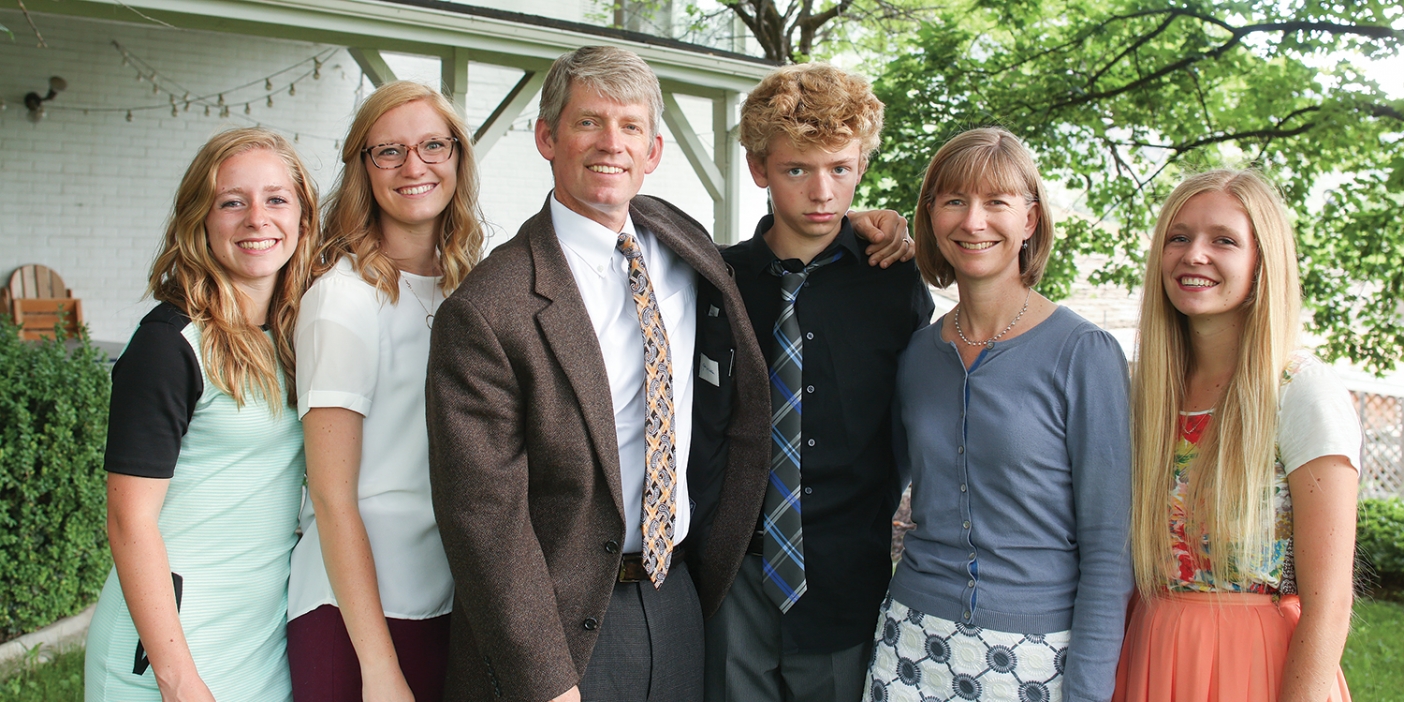Families that Flourish
Families that Flourish
In five years of research, with 700 families and an army of student workers, BYU scholars have unearthed gems of wisdom that help families thrive. And they’ve only just begun.
By M. Sue Bergin (BA ’78) in the Spring 2012 Issue
When Ashley M. Kerns (’12) first started on her journey with the Flourishing Families Project, she had no inkling it would transform her life in so many ways.
Educationally, she’s had an unusually sophisticated research experience while still an undergraduate.
Professionally, doors have already opened that would likely have remained closed.
Personally, she’s found renewed hope that her future family can thrive.
“We often hear about high divorce rates and how the family as an institution is falling apart. When you always have it in your mind that you’re going to fail, you start to wonder if you should even try,” says Kerns. “But my work with the families in the Flourishing Families Project has shown me that family life can be—and often is—filled with joy, love, and fulfilling relationships.”
Kerns is one of nearly 600 undergraduate students who have been part of carrying out the nitty-gritty field and laboratory work in a large multi-year research project to discover what helps families flourish. Now in its sixth year, the project takes mentored-student learning to its limits, utilizing undergraduates to undertake the delicate and sometimes awkward work of getting inside the idiosyncratic world of individual families—700 of them. It takes highly trained and sensitive experts to gain the trust of moms, dads, and pre-teens; encourage them gently through lengthy questionnaires so they don’t give up; videotape them without being intrusive; enter data into a database; and then spend months indexing the videotapes according to a 55-code system.
With government funding now almost impossible to secure for this kind of qualitative research, especially in the social sciences, the Flourishing Families Project should have been unfeasible. Instead, it has not only survived but is thriving. Funded by a variety of BYU endowments and grants as well as by several donors, the project has a phenomenal 93 percent participant-retention rate over each of five “waves” of data collection and a growing vita of published journal articles, many of which include undergraduate authors (see “Family Tips” sidebars for summaries of a few key findings). The success, says Laura P. Walker, associate professor of family life and one of eight principal investigators on the project, is due to one main factor: the students.
“A lot of people criticized us and said we could never use undergraduates for this project,” says Walker, who recruits and trains the students and publishes extensively based on the data they collect. “Because of the quality of students at BYU, we can rely on them to do things that most people hire professional companies to do.”
Getting Inside the Family Circle
The Flourishing Families Project was conceived by a group of researchers at BYU led by Randal D. Day (BS ‘73), a professor in the School of Family Life, long before they began collecting data in January 2007. The group talked often about wanting to look at what was going on inside families, not just observe external signals. “Most studies about families don’t really help us know what really goes on in families,” says Day. “They take the macro-level demographic approach, looking at large populations and finding out, for example, how much divorce is there and what predicts divorce.”
The BYU group wanted to look for what helps families flourish rather than what makes them fall apart. They began by designing a questionnaire that includes items about hope, gratitude, pro-social behavior, sacrifice, commitment, forgiveness, and kindness. They also decided to videotape the families interacting briefly about things like chores, daily routines, and recreation.
The group also wanted the project to fulfill BYU’s objective of providing mentored-student learning opportunities. The result is a study that utilizes students at every stage of the research process, with faculty members mentoring them and hoping many will become exceptional family researchers.
The researchers chose a northern section of Seattle and the Provo area for their data collection. The Seattle sector includes unusual diversity within a relatively small area and also has a low crime rate, offering a safety factor for the students. The Provo area offers the possibility of comparing and contrasting Latter-day Saint families to others. To recruit families, they sent letters of invitation to every family in the area with one or two parents and at least one child in the 10- to 13-year-old age range. From those that responded, they chose a random sample, ending up with 500 families in Seattle and 200 in Provo. The Seattle group “mirrors the north Seattle census statistics,” says Day, with a wide range of education levels and financial situations; about 20 percent are families of color. The Provo area families, as expected, are less diverse.
Now that most of the adolescents are reaching the age of 18 and beginning to leave home, the study has ended its in-person interviews and is shifting to an Internet-based interview format. “We’ll be following the kids—now young adults—as they go on to work, college, relationships, and adulthood,” says Day. They will also continue to follow the parents but in a more limited way.
Opening Doors
Ashley Kerns started training with the project in 2009, her sophomore year. After taking a semester-long preparation course, she and her research partner spent four months during the summer of 2010 interviewing families in Seattle along with nine other two-person teams. By 2011 she had advanced to student leader in Seattle. She’s now helping faculty adapt the study for the Internet phase.
“My job with Flourishing Families has really been so much more than I ever thought I could do while still in college,” says Kerns. “Undergraduates at other universities just don’t get this type of opportunity.”
Like Kerns, Benjamin R. Malczyk (BS ’10) was a superior interviewer for the project as an undergraduate, says Day, the project’s chief principal investigator. Malczyk became a student leader his second year, and his experience helped him gain admission to the esteemed social work program at the University at Albany, State University of New York. He will soon complete a master’s degree there and has already begun a doctorate in social welfare. “Ben exemplifies what BYU’s mentored learning initiative is trying to accomplish and is exactly what we hoped would happen with the project—find the best students, have a mechanism to help them become the best they can be as undergraduates, and then place them in top-notch graduate programs,” says Day.
Malczyk says that his experience with the Flourishing Families Project has made his graduate school experience go much more smoothly than expected. “For many doctoral students, working on a dissertation is their first time gathering or examining data. I came into my program having literally a couple years of experience doing that,” he says. “Perhaps the most important part of my experience with the project was the opportunity to build relationships with professors and to be mentored by them. As I progress toward a doctorate, I know I can go to three or four different professors I worked with and ask for their guidance and suggestions.”
Stephanie Blickfeldt (BS ’10) was planning to use her marriage, family, and human development degree to become a counselor, but after several years with the project, she switched over to research. “I thought I didn’t like research. I thought it was boring and confusing. But when you participate in the process it becomes fascinating. You start to understand how it works and how important it really is. Policymakers can only work with the research they get. We want to give . . . a more holistic picture of what’s really going on with families,” says Blickfeldt, now in a BYU master’s program in marriage, family, and human development.
Recruiting and Training
As word began spreading among BYU students early in the project’s evolvement, recruiting top-notch students like Kerns became easy. By the second year, says Day, students showed up in hordes for initial informational meetings. Faculty advisors had their pick of top performers.
The intensity of the training before a student ever sets foot in a family’s home or begins to code a videotape accounts for much of the project’s—and the students’—success. Walker teaches the course that prepares students for the in-home research, and she says the training process is “now a well-oiled machine.” Students in her class learn how to use a video camera, administer a questionnaire, check the answers for quality, and enter the data into a statistical program. They learn about longitudinal research, how to design their own research project based on the data, and how to present their project at a student conference. “We give them knowledge on every step of the research process so they can really see what research is all about from start to finish,” says Walker.
Walker credits students for the unusually high retention rate of subject families. Professional research companies generally give up after one or two tries, she says, but the BYU students are tenacious. “They get almost a testimony of the project and how important every family is. They’ve gotten really creative, from finding families on Facebook to tracking those that move—as far as Europe.”
Families Flourishing
As Ashley Kerns entered the homes of about 50 families in Seattle in 2010, she didn’t expect to witness so much love and harmony. She remembers one family, in particular, that she met on her first day in the city. They were loving and kind to one another, and after the interview she looked on as the husband and wife worked together at an ordinary task. “The kids were in bed by this time, and we were in the kitchen talking. Together, the mom and dad were making lunch for their kids the next day. It was such a simple thing, but I remember thinking, ‘Wow, this is incredible.’ Family life can be amazing if you make it that way.”
That same summer in Utah County, Sara (name has been changed) was already a veteran child subject of the project. She was 14, and it was her fourth year of having BYU undergraduate researchers administer a lengthy questionnaire (238 items the first year and more the next years), plus videotape her interacting with her parents.
“At first it was a little bit weird. The questionnaire was long and the filming part made me self-conscious,” says Sara, now 16. But being asked mostly the same questions year after year helped her look at her life more closely and adjust a few habits. “It’s made me think about how much time I spend on certain things, and also I saw that I was repeating some things over and again. I decided to change that.”
For her parents the project has helped them assess their parenting. They get a report of results every year, and they’re always eager to read them. “My dad was an alcoholic and mom was emotionally abusive, and I’m trying to break the chain,” says Sara’s father. “I decided long ago that I’m not going to put my kids through that. So it’s been reassuring to read the results and see that—hey—it looks like I’m doing things right. It’s good, positive feedback.”
Faculty researchers have found that working on the project helps them evaluate their parenting as well. Jeremy B. Yorgason (BS ’97), assistant professor of family life and a principal investigator, says he’s a more conscientious parent because of the project. “I have a daughter who is the same age as the kids in the study, and I ask myself how she would be answering the questions about me as her father and how I would be answering the questions. The project helps me be aware of what makes a good family and has made me want to be better in those ways,” says Yorgason.
Unexpected Positives
The perception is widespread that families are disintegrating right and left, but the Flourishing Families Project throws a happy wrench in that idea. “There’s a doom and gloom—that families are falling apart and people don’t know what they’re doing,” says student researcher Blickfeldt. “It’s just not true. There are healthy families everywhere. A lot of people do well based on just a few principles like being involved with your family, spending time with them.”
So far, says Day, the study shows unexpected stability and healthy functioning: “We’ve seen only a handful of divorces among the 700 families. In fact, family members say they’re in conflict with each other ‘rarely” or ‘seldom.’ More than half of the adolescents say they’ve never even seen their parents argue.”
With all the catastrophic thinking about families, how do the researchers explain the project’s overwhelmingly positive findings? Regarding divorce rates, Day says the majority of couples who divorce do so early on. “By the time a family gets to the age and stage of these [project] families, they’ve gone through the turbulent years for the most part.”
He also says it’s important to take into account that almost 30 percent of the project’s sample is composed of single-mother families—so they have already undergone disruption.
Finally, Day believes it’s possible that the 35 percent of families contacted who did not choose to be part of the sample might be more unstable and thus did not want to participate in a study about the positives of family life.
Whether the sample of families turns out to be flourishing more than average will likely be debated over time, but the more important finding from the project to date is clear: There are many ways families can flourish, and the project researchers are finding more of those ways each year. To Ashley Kerns, the message is overwhelmingly optimistic: “Each family has their own struggles and successes, but the most valuable piece of information I’ve gained from my experience with the Flourishing Families Project is the understanding that in the face of daily struggles, most families are strong and resilient. I do not believe that families desire to fail. They desire to succeed, and I see success as I work with these families.”
Family Tips: Sacred Living
Follow five “sacred living” strategies that Flourishing Families researchers have found are powerful factors in making family life and marriages stronger, happier, and more stable.
Family Tips: Tradition!
Build family closeness with routines and rituals, such as regular family meals together, annual celebrations specific to your family, and vacations you plan together. Religious rituals like church attendance, prayer, and scripture reading can prevent your children from developing entitlement attitudes. Be cautioned, though, that just going through the motions habitually can do more harm than good. Make sure your routines and rituals aim for transformation of the heart.
Family Tips: Invite Grandma to Dinner
Encourage intergenerational ties with grandparents and other extended family. Help grandparents make their time with your children meaningful and memorable, especially if they live far away and aren’t able to visit often. Seek balance in giving and receiving from extended family, and draw clear emotional boundaries if necessary.
Family Tips: The Family that Techs Together . . .
Exploit technology to draw your family closer together. Text affectionate and funny messages to your children, not just “monitoring” messages. Use social network sites to praise your children to others. Play video games together; girls especially can benefit when their parents play video games with them.
Freely forgive. Let go of hurts quickly and check in with your spouse and children about whether they see you as forgiving.Be kind. Be patient, speak kindly, and assume good motives in other family members.Be committed. Speak and act in ways that show your family you’re in it for the long haul.Be willing to sacrifice. Understand that your way isn’t always the best way, and you might have to give up things you want or need for the greater good of your family.Don’t be relationally aggressive. Don’t talk badly about each other to other people, don’t use the silent treatment, and don’t dismiss another family member’s feelings.
Sue Bergin is a chaplain for VistaCare Hospice in Salt Lake and Utah Counties.
Illustrations by Penelope Dullaghan
Feedback: Send comments on this article to magazine@byu.edu.




